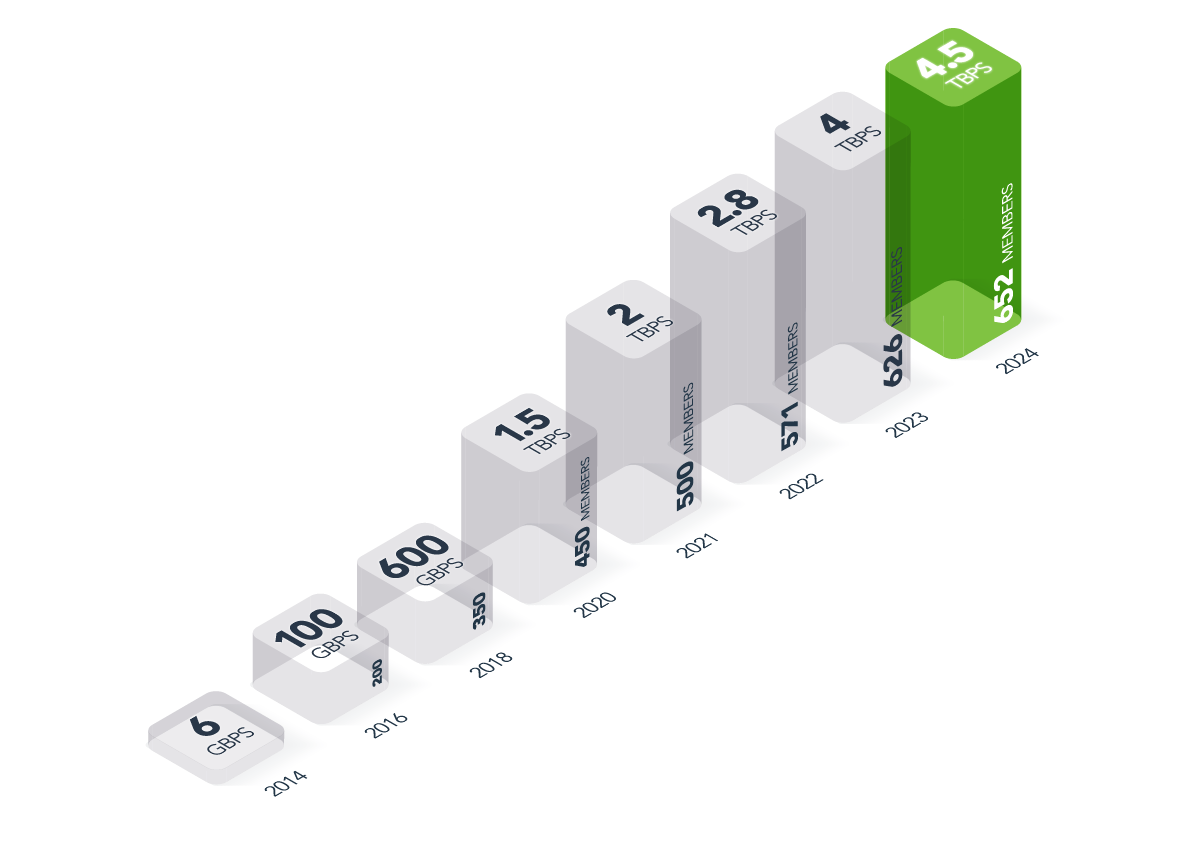NAPAfrica, Africa’s leading Internet Exchange Point (IXP) and the seventh largest IXP globally, has reached a significant milestone, driving 4.5Tbps of traffic as its peering community continues to grow. Adding to its existing members, including Akamai, Amazon, Apple, ByteDance (TikTok), CDN77, Cloudflare, Facebook (Meta), Google, Microsoft, and Netflix, are Mimecast, Fortinet and Tencent, cementing NAPAfrica’s position as a critical digital infrastructure hub for Africa’s internet.
NAPAfrica has expanded its peering community by over 40 peers over the last year to 652 unique organisations, solidifying its role as the heartbeat of African internet traffic. Based in Teraco’s data centres in Cape Town, Durban, and Johannesburg, serving the peering needs of internet operators across Africa, the exchange crossed the 4Tbps mark in November 2023 and has since expanded to support a diverse and ever-growing network of local and global peers.
Peering’s role in driving African digital growth
“This ongoing growth is a testament to Africa’s vibrant internet community, which has embraced peering, data-intensive applications, cloud adoption, and the rising demand for video, content, and gaming services,” says Andrew Owens, Interconnection and Peering Lead at Teraco.
“Higher traffic levels between cloud providers, enterprises, and end users highlight how essential peering is in accelerating digital transformation across the continent. Our mission is to equip our clients with a seamless, reliable infrastructure to serve their communities effectively across Africa,” he adds.
Peering is the bedrock of this success, offering a cost-effective, high-performance way for content providers and businesses to deliver content to end users efficiently. By interconnecting directly with other networks, NAPAfrica members benefit from reduced latency, faster delivery speeds, and significant cost savings, all critical factors for companies as demand for cloud and entertainment services in Africa skyrockets.
400Gbps interconnection options
On the back of growth in traffic volumes, NAPAfrica continues to evolve its service offerings. In a significant technology leap, NAPAfrica is now the first Internet Exchange in Africa to offer 400Gbps interconnect options, catering to the needs of large-scale content providers and cloud service providers.
Enhanced network visibility with Kentik
NAPAfrica is also empowering its members by introducing the Kentik Network Observability platform, a state-of-the-art tool that provides critical insights into network performance. With Kentik, peering managers, network engineers, and security teams can better manage traffic, optimise performance, and predict capacity needs, which results in even smoother content delivery and improved network resilience.
More regional caching
NAPAfrica is now hosting regional cache servers, significantly enhancing regional content delivery. NAPAfrica now also hosts Netflix Open Connect cache servers in Cape Town and Durban. By reducing the distance data must travel, this initiative enables faster load times for local audiences, enriching the local user experience while making participation even more attractive for new members.
Backbone of African digital transformation
As global cloud providers and enterprises accelerate their African expansion plans, NAPAfrica supports these ambitions. Michele McCann, Head of Platforms at Teraco, says, “The presence of hundreds of carriers and networks, key content providers and cloud services underscores a vibrant peering community that drives affordable, effective content distribution, enabling businesses to meet rising demands for cloud-based and entertainment services.”
With critical infrastructure in place, NAPAfrica is fuelling Africa’s digital future, providing the backbone for internet services and cloud adoption. It’s a partnership-driven model that ensures organisations can support internet communication, cloud strategies, and enhanced connectivity, all crucial as Africa’s demand for digital services continues to climb.




